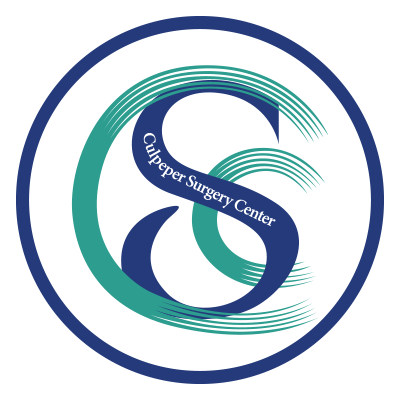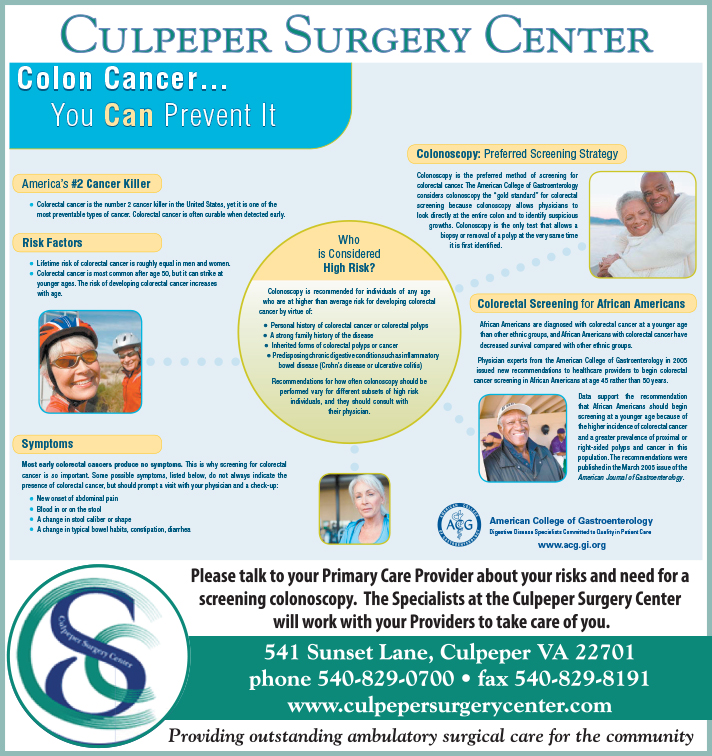Gasteroenterology
Gasteroenterology
COLON CANCER – You Can Prevent It
Overview
Colorectal Cancer is the second leading cause of Cancer related deaths in the United States. Most recent estimates for Colorectal Cancer in the United States for 2009 are:
- 106,100 new cases of Colon Cancer
- 40,870 new cases of Rectal Cancer
- 49,920 deaths from Colorectal Cancer
Colorectal Cancer risk increases with age. With early detection and removal of pre-cancerous polyps, survival rates exceed 90 %. Undergoing routine screening through a procedure known as a Colonoscopy remains the number one way to detect early stages of Colon Cancer. The American Cancer Society recommends that everyone over the age of 50, have a Screening Colonoscopy. However, people with a personal or family history of polyps should talk to their Primary Care Health Providers about beginning Screenings earlier than age 50.
Culpeper Surgery Center has a beautiful Endoscopy Suite and has other Procedure Rooms to make the Colonoscopy more convenient and less stressful than ever before. The Endoscopy Suite and Procedure Rooms features state of the art equipment – the Olympus Endoscopes – run by highly skilled Staff, and the Center has a very professional and private environment for preparing and recovering from the procedure.
Culpeper Surgery Center is committed to increase awareness of Colon Cancer in the Community, and is pleased to offer a screening program in coordination with the Primary Care Health Providers and the GI Specialists who are dedicated to the highest level of professionalism.
Culpeper Surgery Center provides the highest quality of outpatient Surgical Services to the Community in the most aesthetically pleasing environment.
Screening Colonoscopy
The death rate from Colorectal Cancer has been decreasing for the past 15 years. Most Colon Cancers (98%) start from a polyp. Thanks to Colorectal Cancer Screening, polyps can be found and removed before they turn into Cancer. Also Colorectal Cancer can be detected in the early stages with Screening Colonoscopy and treated when it is easier to manage.
Knowing your risk and discussing with your Primary Care Health Provider is the first step towards Colon Cancer prevention.
Controllable and Uncontrollable Risk Factors:
- Family History: First-degree relative (father, mother, brother, sister, or child) who has had Colon Polyps or Colon Cancer.
- Personal History: Previous Polyps, previous Colon Cancer removed, or Ulcerative Colitis/Crohn’s Disease.
- Age: Higher risk after the age of 50.
- Diet: High fat diets (animal sources) increases the risk of Colon Cancer.
- Ethnic Background: People of Eastern European descent who are Jewish have a higher risk of Colon Cancer.
- Alcohol: Colon Cancer has been linked to heavy alcohol use.
- Smoking: Studies have showed smokers are 30%-40% more at risk for having Colon Cancer.
- Lack of exercise: Inactivity puts you at a higher risk of Colon Cancer
- Overweight: Being overweight puts you at a higher risk, especially if you have the extra fat in the waist area more so than around the hips.
Symptoms to look for:
- Changes in bowel movements such as diarrhea or constipation, or if the caliber of stool changes (narrowing) for more than a few days.
- Blood in the stool, on the toilet paper, or any rectal bleeding.
- Cramping or abdominal pain, which is steady.
- Weakness, tiredness or unintentional weight loss of significant amount.
- Feeling of having to have a bowel movement even after having one.
Having these symptoms does not mean that you have Colon Cancer, but you do need to talk to your Primary Care Health Provider. Some people have Colon Polyps or Colon Cancer with no symptoms at all. That is why Screening is invaluable.
Who should be screened?
The screening process should start at age 50 if there are no factors indicating a high-risk profile. People who are considered high risk are those who have a personal or family history of polyps or Colon Cancer. If you have a family history then your screening should start 10 years before the age of the family member who was diagnosed (e.g., father at age 48 then you start screening at age 38). Family members include first degree relatives – father, mother, brother, sister or children.
Screening Tests
The colonoscopy is considered the “Gold Standard” Screening Test. It allows the entire length of the large colon to be visualized. A bowel cleansing solution is ingested the evening before this procedure, and the patient receives sedation for the procedure. The GI Specialist will visualize the lining of the colon through the Colonoscope and any abnormality can be biopsied or removed at that time. There are other Screening Tests that can be performed: Fecal Occult Blood Test (stool cards), Flexible Sigmoidoscopy – this visualizes the lower one-third portion of the colon, and Barium Enema. Your Primary Care Health Provider will discuss these options with you.
How our Screening Colonoscopy Clinic Works
A referral with your History and Physical Exam will be sent from your Primary Care Health Provider directly to the office of one of our GI Specialists.
The GI Specialist will schedule a date for your procedure in coordination with the Scheduling Office at the Culpeper Surgery Center. The GI Specialist will also advise of the Bowel Prep that they intend to select for your procedure.
You will then be contacted by phone by one of the Preoperative Screening Nurses from the Culpeper Surgery Center and a Medical Screening will be performed.
A packet of information will then be sent to you, which will include a prescription for the Bowel Prep and will also include other forms for Demographics, Medical History and Insurance.There will also be instructions and a contact name at the Culpeper Surgery Center for any questions that need answering. You will be expected to fill and return the packet in entirety at the earliest to facilitate confirmation of your appointment.
One week before your appointment you will be contacted by one of the Coordinators from the Culpeper Surgery Center or from the GI Specialists office to review preparation instructions.
On the day of your procedure, you will report to The Culpeper Surgery Center and will be checked in for the Procedure.
After the procedure the GI Specialist will review any findings and answer your questions. A follow-up letter will be given to you and copies of any reports will be sent to your referring Primary Care Provider.


